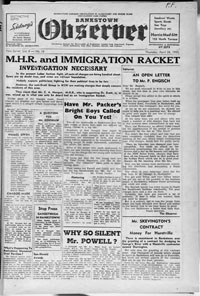82 Motions concerning contempts
A motion to:
-
determine that a person has committed a contempt; or
-
impose a penalty upon a person for a contempt,
shall not be moved unless notice of the motion has been given not less than 7 days before the day for moving the motion.
Amendment history
Adopted: [25 February 1988 as Privilege Resolution 8, J.534–36]
1989 revision: Incorporated into the standing orders as SO 82 with consequential amendments
Commentary

Fitzpatrick and Browne being taken into custody. The Senate did not wish to follow the example set by the House of Representatives in 1955 (Source: Sydney Morning Herald, 10 June 1955)
Like the previous SO, standing order 82 was adapted from one of a set of resolutions relating to parliamentary privilege, agreed to by the Senate on 25 February 1988. Resolution 8, in turn, was based on Recommendation 22 of the Joint Select Committee on Parliamentary Privilege.[1]
The committee argued that the interests of justice required that due consideration be given to any motion that, if carried, would result in the imposition of a penalty. It recommended a seven day cooling-off period between the giving of any notice of motion to impose a penalty and the consideration of the motion:
Such a cooling-off period would enable Members to inform themselves fully on the question, consult with colleagues, and take soundings of the public reaction to what is proposed.

One of the offending articles from the Bankstown Observer that got Fitzpatrick and Browne into trouble (Source: Bulletin 15 June 1955, p.7)
The committee was mindful that this had not occurred in the 1955 case of Fitzpatrick and Browne who had been imprisoned on the order of the House of Representatives by resolution carried two days after the House Privileges Committee report on the case was presented to the House.
Although the joint select committee did not consider that there should be any special rule in cases where a non-penal sanction was recommended, the Senate took a broader view in adopting the resolutions relating to parliamentary privilege in February 1988. Explanatory notes circulated with the proposed resolutions explained that it was not clear from the committee’s report whether the seven day notice period was intended to apply to a motion declaring a person to be guilty of contempt as well as a motion for imposing a penalty.[2] This was assumed to have been the intention and the resolution was drafted accordingly.
The seven day notice period applies to any motion determining a finding of contempt and any motion to impose a penalty for contempt. In the absence of a definition of “penalty” which would limit it to the statutory penalties in s.7 of the Parliamentary Privileges Act 1987, the term is given its general meaning and is taken to apply to any motion recommending a sanction of any kind.[3]